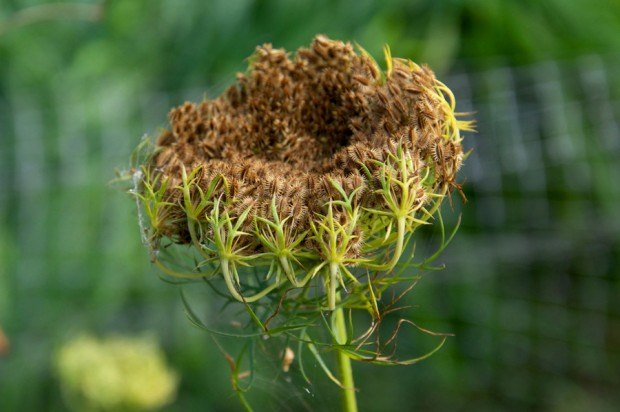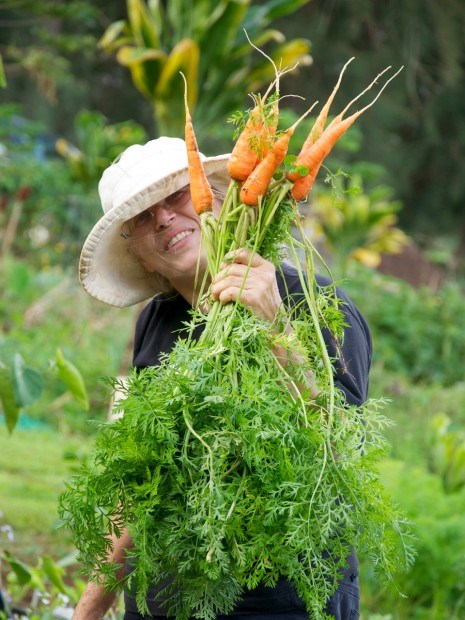LIHU‘E — The 10th Biannual Kaua‘i Community Seed and Plant Exchange this Sunday will highlight the current status of genetically modified seed production on Kaua‘i. “GMO crops can easily cross-pollinate organic and heirloom seed crops, contaminating their genetic lineage forever,”
LIHU‘E — The 10th Biannual Kaua‘i Community Seed and Plant Exchange this Sunday will highlight the current status of genetically modified seed production on Kaua‘i.
“GMO crops can easily cross-pollinate organic and heirloom seed crops, contaminating their genetic lineage forever,” said Paul Massey, Kaua‘i Community Seed Bank manager.
Representatives from GMO-Free Kaua‘i, a founding organization of the seed exchange, will shed light on the geographic growth of GMO crop production on Kaua‘i, as well as its consequences to garden and farm seed savers.
“GMO field experiments are in total opposition to our mission on Kaua‘i to be a healthy, sustainable island” said Jeri DiPietro, of GMO-Free Kaua‘i. “The open air tests are for developing commodity crops that are resistant to pesticides, and crops that produce their own insecticide.”
DiPietro said GMO research involves heavy spraying of chemical cocktails near schools, neighborhoods and waterways.
“The experiments are occurring on our important agricultural land and require a large amount of our fresh water resources,” she said. “These experimental crops are not producing local food and are leaving us with a huge toxic impact.”
Genetically modified food is a hot topic on Kaua‘i and nationally, as several states battle to get labeling of GMOs on the ballot or otherwise passed into law, states a press release from the Kaua‘i Community Seed & Plant Exchange.
Growing impacts to human and environmental health have fueled the debate on impacts caused by the modified organisms themselves, and by the liberal application of pesticides and herbicides used in the industrial production of GMO food, according to event organizers.
By contrast, small diversified farms and gardens on Kaua‘i are improving the health of people and the local environment by producing nutrient dense foods and supporting the natural balance provided by a diversity of mutually beneficial organisms — from worms to honeybees. A crucial component of that diversity is the variety of plants used for food production, and the best place to find that is at the Kaua‘i Community Seed and Plant Exchange.
Massey said the majority of vegetable and fruit varieties found on Kaua‘i are still GMO-free, including a wealth of tropical plant diversity. These “safe food” choices will be the stars of Sunday’s exchange. Examples include tapioca, a tasty South American carbohydrate-rich tuber that thrives with minimal care, and its close relative chaya, a leafy green superfood.
However, some island favorites already suffer almost certain GMO contamination, so for the first time event promoters are asking participants to leave their corn and papaya seeds at home.
“We want to illustrate the severity of the problem by excluding corn and papaya from the exchange … more varieties will be unsafe in the near future unless we stop the genetic modification of our food supply” Massey said. “Crop improvement and adaptation is essential to feed the planet, and needs to be conducted through time-tested traditional breeding practices, not dangerously unpredictable genetic manipulation.”
Last year’s seed exchange in April drew nearly 300 participants to the Children of the Land Center in Kapa‘a, home of the Kaua‘i Community Seed Bank.
Sunday’s event will be from noon until 5 p.m. at the Lihu‘e Neighborhood Center, at 3353 Eono Street. Admission is free.
Participants are invited to bring pest-free, GMO-free, noninvasive seeds, plants, and cuttings to share. Pant and seed check-in is from noon until 1:45 p.m. The pule (blessing) is at 2 p.m., immediately followed by the exchange. The presentation “GMOs on Kaua‘i update” runs from 3 to 4 p.m. There will be gourmet food, and live music by Malama Pono Allstars.
Call 652-4118 for more information.



